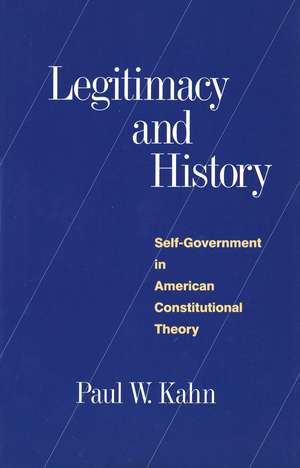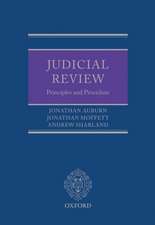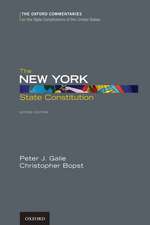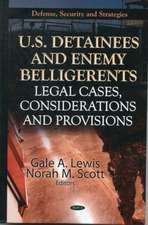Legitimacy and History: Self-Government in American Constitutional Theory
Autor Paul W. Kahnen Limba Engleză Paperback – 22 feb 1995
This powerfully conceptualized book is both a rich intellectual history of two hundred years of American constitutional theory and an original philosophical inquiry into the possibility of self-government. Legitimate government in the United States means self-government. Yet Americans also believe that their government must be constrained by a Constitution that is now two hundred years old. Paul W. Kahn sees the development of constitutional theory as a continuous effort to resolve this conflict between self-government and history.
Rejecting the conventional idea that constitutional thought has been shaped by political and social events, Kahn argues that the history of constitutionalism has been driven by logic, not experience. He brings this perspective to the familiar events of constitutional history, including the founding, the crisis of Dred Scott, Lincoln's Gettysburg Address, the rise of the Lochner Court, the assault of legal realism, and the rise of the countermajoritarian difficulty. Kahn describes a series of conceptual stages in constitutional history. He shows that the founders' project of constitutional construction was displaced by originalism, which was in turn displaced by the idea of an evolving constitution. The turn to community in contemporary constitutional theory, Kahn argues, represents the final step in this development. At this stage, the theory and practice of constitutional law split apart. This separation is the inevitable result of the effort to do the impossible: reconcile history and self-government.
The authority of the state, Kahn concludes, is bound to history in a way that makes government by the people impossible.
Rejecting the conventional idea that constitutional thought has been shaped by political and social events, Kahn argues that the history of constitutionalism has been driven by logic, not experience. He brings this perspective to the familiar events of constitutional history, including the founding, the crisis of Dred Scott, Lincoln's Gettysburg Address, the rise of the Lochner Court, the assault of legal realism, and the rise of the countermajoritarian difficulty. Kahn describes a series of conceptual stages in constitutional history. He shows that the founders' project of constitutional construction was displaced by originalism, which was in turn displaced by the idea of an evolving constitution. The turn to community in contemporary constitutional theory, Kahn argues, represents the final step in this development. At this stage, the theory and practice of constitutional law split apart. This separation is the inevitable result of the effort to do the impossible: reconcile history and self-government.
The authority of the state, Kahn concludes, is bound to history in a way that makes government by the people impossible.
| Toate formatele și edițiile | Preț | Express |
|---|---|---|
| Paperback (1) | 295.32 lei 6-8 săpt. | |
| Yale University Press – 22 feb 1995 | 295.32 lei 6-8 săpt. | |
| Hardback (1) | 520.22 lei 6-8 săpt. | |
| Yale University Press – 27 ian 1993 | 520.22 lei 6-8 săpt. |
Preț: 295.32 lei
Nou
Puncte Express: 443
Preț estimativ în valută:
56.56€ • 58.27$ • 47.38£
56.56€ • 58.27$ • 47.38£
Carte tipărită la comandă
Livrare economică 24 februarie-10 martie
Preluare comenzi: 021 569.72.76
Specificații
ISBN-13: 9780300063073
ISBN-10: 0300063075
Pagini: 272
Dimensiuni: 156 x 235 x 17 mm
Greutate: 0.4 kg
Ediția:Revised
Editura: Yale University Press
Colecția Yale University Press
ISBN-10: 0300063075
Pagini: 272
Dimensiuni: 156 x 235 x 17 mm
Greutate: 0.4 kg
Ediția:Revised
Editura: Yale University Press
Colecția Yale University Press
Notă biografică
Paul W. Kahn is professor of law at Yale Law School.








